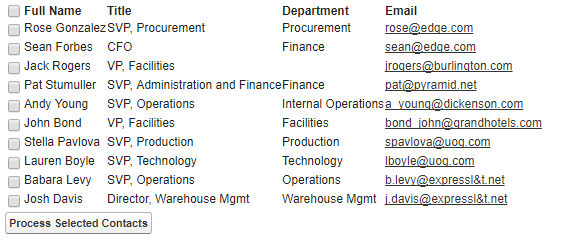Export Data In Excel Using Visualforce Page
Here in below example I have a VF Page “AccountDetails.vf” with parameter of account Id. In that VF Page I’m showing the Account record respective Contacts. And a button that export the Contact records to excel sheet. Another VF Page “ContactExportToExcel.vf” for excel.
Viualforce Page: AccountDetails.vf
<apex:page standardController="Account" extensions="ContactExportToExcel">
<apex:form>
<apex:pageBlock title="Hello {!$User.FirstName}!">
You are viewing the {!account.name} account.
</apex:pageBlock>
<apex:pageBlock title="Contacts">
<apex:pageBlockTable value="{!account.Contacts}" var="contact">
<apex:column value="{!contact.Name}"/>
<apex:column value="{!contact.Email}"/>
<apex:column value="{!contact.Phone}"/>
</apex:pageBlockTable>
</apex:pageBlock>
<apex:commandButton value="Export To Excel" Action="{!ExportToExcel}"/>
</apex:form>
</apex:page>
Remember to pass an Account ID as a query string to this page.
Controller:
public with sharing class ContactExportToExcel {
Public List<String> selectedFieldsList {get;set;}
Public List<Contact> conList {get;set;}
public ContactExportToExcel(ApexPages.StandardController stdCtrl) {
Account acc = (Account)stdCtrl.getRecord();
conList = New List<Contact>();
conList = [Select Id, Name, Email, Phone From Contact Where AccountId =: acc.Id];
}
Public PageReference ExportToExcel(){
selectedFieldsList = New List<string>();
selectedFieldsList.add('Name');
selectedFieldsList.add('Email');
selectedFieldsList.add('Phone');
PageReference pgRef = New Pagereference('/apex'+'/ContactExportToExcel');
pgRef.setRedirect(false);
return pgRef;
}
}
Visualforce Page: ContactExportToExcel.vf
<apex:page standardController="Account" extensions="ContactExportToExcel" contentType="application/vnd.ms-excel#Contacts.xls" cache="true">
<apex:pageBlock >
<apex:pageblocktable value="{!conList }" var="tab">
<apex:repeat value="{!selectedFieldsList}" var="field">
<apex:column value="{!tab[field]}"/>
</apex:repeat>
</apex:pageblocktable>
</apex:pageBlock>
</apex:page>

